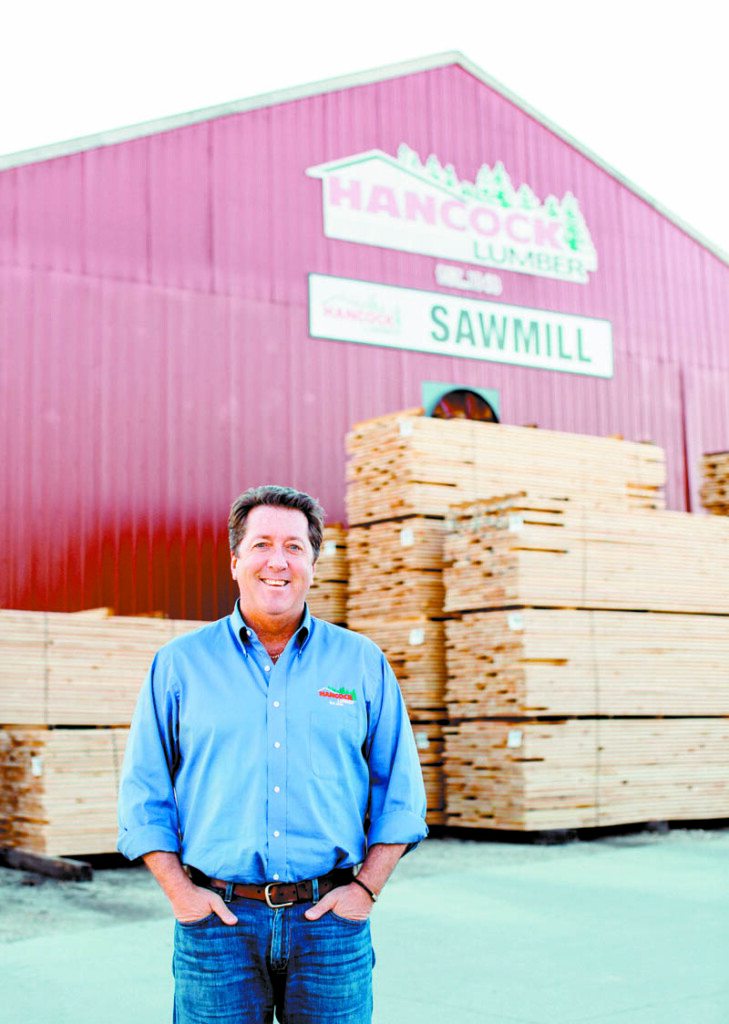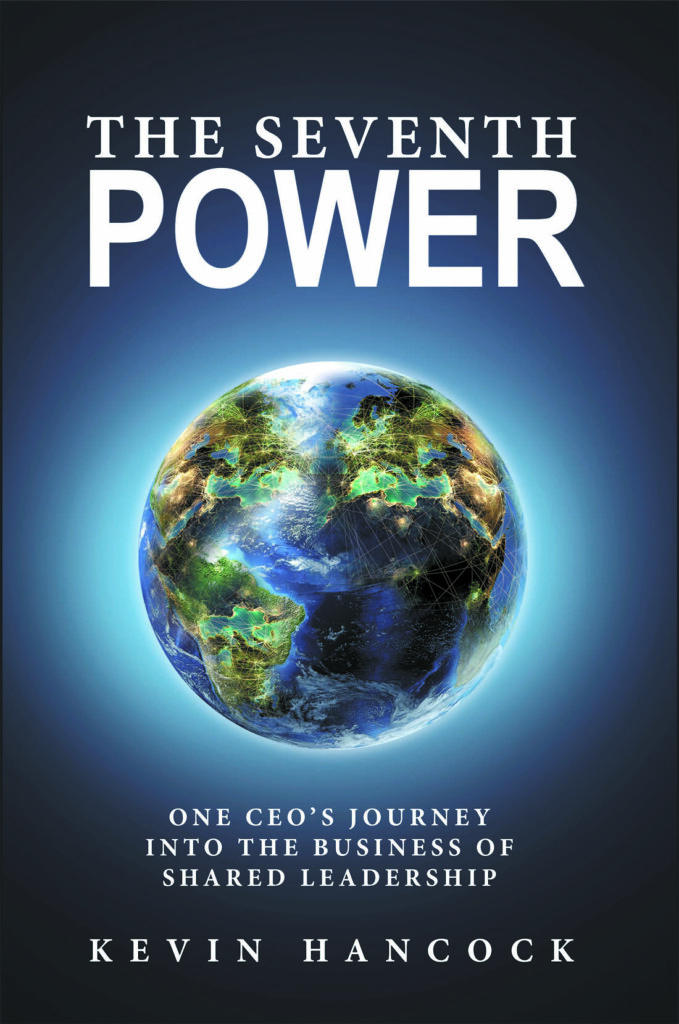Worth a Browse: Kevin Hancock’s different path to leadership

By Wayne E. Rivet
Staff Writer
As Kevin Hancock started to lose his voice, he discovered both a different perspective on life and business, as well as a new tool to convey his thoughts.
Traveling to the Pine Ridge Indian Reservation in South Dakota — one of the biggest, poorest and most remote of all the Sioux reservations on the Northern Plains — Kevin encountered an entire community that felt like it had lost its voice.
“It felt marginalized and pushed aside and not fully heard,” Kevin says.
The experience became the basis of Kevin’s first published book, Not For Sale – Finding Center in the Land of Crazy Horse, 2017.
As his ability to speak worsened, Kevin had to change his approach on the business front as CEO of Hancock Lumber.
“Putting my own condition together with their situation, I got thinking there are lots of ways for people to lose their voice in this world or a piece of their voice. Unfortunately, across time, leaders have done more to limit, restrict, intimidate or direct the voices of others than to free them, whether it was a company or on an Indian reservation out West,” Kevin said during a recent 30-minute interview with Mainebiz publisher, Donna Brassard, as part of its new podcast series, “The Day That Changed Everything.” “I put it all together and really got me thinking about a new, fresh approach to leadership that strengthens the voices of others and having applied that approach to our own company I got thinking about sharing those ideas more broadly which became the basis of my book, The Seventh Power — One CEO’s Journey into the Business of Shared Leadership.”

Number of pages: 255
Hardcover cost: $27 (also available in Kindle at $9.99 and audio book form at $14.69).
Paperback cost: Not available.
Where to buy: The book is available at Bridgton Books, the author’s personal website (www.kevindhancock.com), Amazon.com, Barnesandnoble.com and other retailers across Maine.
Number of books you have published: 2
• Not For Sale – Finding Center in the Land of Crazy Horse, 2017.
• The Seventh Power – One CEO’s Journey into the Business of Shared Leadership, 2020.
About the Author: A resident of Casco, Kevin is CEO of Hancock Lumber. He is a graduate of Lake Region High School and Bowdoin College. Kevin is past chairman of the National Lumber and Building Materials Dealers Association. Kevin is also a recipient of the Ed Muskie ‘Access to Justice’ Award, the Habitat For Humanity ‘Spirit of Humanity’ Award, the Boy Scouts of America ‘Distinguished Citizen’ Award, and Timber Processing Magazine’s ‘Man of the Year’ Award.
As part of The News’ series featuring local authors, Kevin Hancock discusses his second book and time spent as a writer”
BN. What lured you to writing?
KH. I acquired a voice disorder a decade ago. That was the event that triggered my writing for two reasons. First, I couldn’t always say everything that I wanted to while speaking but when I wrote I could fully express myself. Second, it gave me a theme to write about which was the sacredness of each human voice. Almost all of my writing connects back to advocating for communities and individuals that do not feel fully heard and leadership strategies designed to strengthen the voices of others.
BN. Do you schedule time to write or do you start when ideas strike you?
KH. Longest writing session, shortest? I do schedule times to write but I have learned to be flexible. If I sit down to write and the words don’t start flowing I walk away. It’s important to be patient and not force it. Other times, the opposite happens. Perhaps I am not planning on writing but the ideas just start pouring into me. When that happens, if at all possible, I adjust my plans and jump on my laptop and just let the words flow.
BN. What was the “inspiration” behind this book?
KH. The inspiration behind this book was to layout a new leadership model that disperses power instead of collects it. Said differently, the inspiration was to encourage every human being to embrace their own unique voice.
BN. Give a brief account of what the book is about.
KH. The book begins on the Navajo Reservation in Northern Arizona and ends in Kiev, Ukraine. Along the way, I make seven stops to visit seven different organizations uncovering one clue at a time about the nature of shared leadership and how to embrace it. For example, one of the lessons in the book is: ‘listen for understanding, not judgement.’ That chapter takes place at the Seeds of Peace Camp. I spent several days there in 2018 interviewing campers and staff while looking at their model for helping people from very diverse backgrounds and belief systems come together and listen to each other productively. Another lesson explored in the book is that ‘over-reaching has consequences.’ In that chapter, I traveled to Kiev, Ukraine to interview two of the last remaining survivors of the Holodomor (forced starvation of Ukrainian peasants by the Soviets in the early 1930s). Here, I look at the unfortunate truth that those who hold the most power often go too far and use their position to take advantage of others.
BN. Did you experience bumps in the road while writing (examples), and how did you move forward?
KH. Yes, for sure! It’s a bit of a roller coaster writing a book. One day, I might look at what I have written and feel great about it. The next day, I might read the very same passage and think it’s terrible. You really have to wrestle with your stories in order to find the path that brings them to life. It takes a lot of patience. Additionally, the process of getting published is very challenging. Mainstream publishers are pretty set in their ways in terms of what they are looking for and it can be hard to get their attention. The ability to self-publish today however creates an avenue for anyone to share their stories. I love this because it gives everyone who wants to write a book the opportunity to do so.
BN. How did you go about developing the story?
KH. Well, my stories are all non-fiction. I have been a direct participant in both books that I have written so I have really had to learn to be patient and let what I was experiencing play itself out. It’s challenging to be a character in your own writing because you have to be willing to be very vulnerable and share stuff that resides in your sole. At the same time when you writing about what you are experiencing, you have the chance to share something that only you can write.
BN. What worked well?
KH. Writing about what inspired me or what scared me or what changed me worked well because that kind of story is just sitting right there inside us all. All it takes is the willingness to look inward, write what you feel, and share it.
BN. What didn’t?
KH. Sometimes, I overwrite. Learning that less can be more is a very important writing skill. I often want to describe every detail and thought but it’s important to leave pieces of the story to the reader’s imagination and interpretation. The more I write, the better I get a leaving space for the reader to shape the story.
BN. What do you think readers will enjoy most reading this book?
KH. Well, it’s not your typical leadership or business book. Each chapter is an independent story that’s designed to be fun to read. The lessons are buried in the stories of others. Additionally, those lessons are designed to be applicable for everyone – not just business leaders.
BN. How have you grown as a writer?
KH. I’ve learned to get more feedback during the writing process. Once you’ve published a book its set and done. The time to get critical feedback is during the draft process. It’s super important to have a diverse group of trusted people read sections of your work before you publish it.
BN. Any advice you received from others that positively affected your writing style or choice of genre?
KH. Yes! I get a lot of feedback from readers and I appreciate it every time. The most common theme is that people appreciate the authenticity of my writing. They feel they know me when they finish and that in some way, more importantly, they come to know themselves better. My books are designed to encourage self-reflection and looking inward where the truth for all of us resides.
BN. What is next?
KH. Well, I’m actually working on a third book I hope to publish in 2021. The book is preliminarily titled “48 Reflections.” It’s a collection of short writings about what I believe are some of the most important thoughts for the future of humanity in the 21st century and it also includes some of my favorite pictures I have taken from my time on the Pine Ridge Indian Reservation in South Dakota and the surrounding northern plains. So, it’s a picture book and an idea book wrapped together. Each of the 48 reflections is exactly 248 words and is surrounded by two pictures. I take a lot of my ideas from being alone in nature and this book tries to capture the beauty and power of the vastness of nature.

